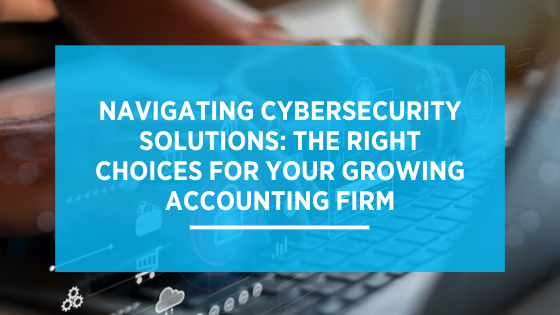Navigating Cybersecurity Solutions: The Right Choices for Your Growing Accounting Firm

How do we navigate cybersecurity solutions? There was a time when a few locks and an office safe were all an accounting firm needed to maintain secure records. Accountants have always prided themselves on maintaining the utmost security in order to assure clients that their finances are in good hands. Of course, the time of simple locks has long since passed.
Accounting firms today must contend with an ocean of hackers and digital bad actors who would love to get their hands on the copious sensitive data that your firm handles every day. Financial and personal information are at the heart of your business. This makes your data stores a treasure trove for modern hackers.
As your accounting firm builds a cybersecurity stack to defend your precious data, it’s important to know the right way to approach cybersecurity solutions. With so many vendors and cloud services available, where does your responsibility lie and what can you do to ensure the utmost data security for your clients?
This guide will help you to make the right cybersecurity solutions and choices for your growing accounting firm.
Protecting Data is Paramount for Any Accounting Firm
Cybersecurity has become a top priority in the accounting business because protecting client data is essential. The data you handle is also exactly what waves upon waves of modern hackers desire to steal. Accounting firms must build their entire software solution stack with robust security from the ground, up. No matter what cybersecurity choices your firm makes, maintaining absolute security for client data should be your guiding principle.
Understand the Cloud Shared Responsibility Model for Data Protection
Because your accounting firm is a modern business, there’s a good chance that you will use cloud-based platforms and tools. Cloud business software allows for remote and mobile work. Often, the best tools for business management are now created by cloud hosts and providers.
However, the most important thing to remember about cloud cybersecurity is the shared responsibility model. This model holds that the cloud provider is responsible for cybersecurity on a physical layer. They also often provide certain hosting layer protections. However, the user is responsible for security based on how they handle and defend the data within each account’s cloud services.
Navigating Cybersecurity Solutions: Know Your Data Handling Compliance Standards
Depending on your location and the location of all your clients, your accounting firm is likely held to data protection regulations. Data compliance laws vary by state and all data from European clients must adhere to the General Data Protection Regulation (GDPR). There are also data security standards that you can choose to comply with and certify with regular inspections. Not only is compliance important for legal operations. But clients also appreciate when their accounting firm will go the extra mile to prove data security through compliance with security standards.
Maintain End-to-End Encryption, No Matter Your Software Stack
Encryption is what protects your data, even if it is stolen or spied upon by hackers. Encryption encodes your accounting firm data into gibberish that can only be unencrypted with a key so complex that it cannot be cracked or reverse-engineered.
End-to-end encryption ensures that your data is encrypted at all times. It is encrypted when accessed, when traveling across networks and internet channels and when stored in long-term archives while encrypted. Any gap can expose your firm to the risk of data exposure during the next cybersecurity incident.
This means that no matter what software you choose to use to manage your firm, accounting data, website, or client portal, it must keep data encrypted at all times without a single gap.
Use a Cloud Archiving Service for Immutable Records
In accounting, you create a vast quantity of records that must be placed into long-term storage and never changed from that moment. There are specific cloud-based data archival services that store data in a format that cannot be changed once the archive is created. These solutions are particularly well protected because it can be made impossible to edit or change files once stored.
Use VPNs and Regularly Scan Devices for Malware/Spyware
Do not expose your accounting firm or personal devices to unnecessary risk. Always connect to the internet using a Virtual Private Network (VPN), which obscures the IP address and other details of the user. A VPN can make it harder to put malware on your system and nearly impossible to trace a user back to their secure digital environment.
That said, malware is everywhere and exposure can happen even to the most cautious. Therefore, it may be necessary to scan all company workstations and employee personal devices on a regular basis for signs of malware and eradicate unwanted processes immediately.
Use Robust Identity, Authorization and Access Protocols
Identity and access management is a must. It is vital that only authorized members of the firm and the clients themselves can access client payment information. This means you need a robust system of identifying and verifying users and a considerate network of authorization so that no one person has full access to all the sensitive data handled by your firm.
These defenses include strong passwords, biometric identification, two-factor and multi-factor authorization and other methods used to ensure only the intended user can access each account.
Be Prepared to Never Pay a Ransom With Backup Recovery Planning
Ransomware is being used with increasing frequency against brands that can’t afford to lose any data. This includes accounting firms, therefore, it is important to prepare a plan in case of ransomware or similar attacks. The key is to know that you never have to pay the stated ransom to get your files back.
Take both comprehensive backups to quickly restore a full-system wipe and daily backups that can ensure that you never lose more than a few hours of work should you have to ‘reload from save.’ The key is a good backup recovery plan in which you build a routine and practice what it takes to recover from ransomware should the attack ever occur.
Keep Pace With Software Updates and Recent Security Patches
Updates are also an important part of keeping your accounting firm’s data secure. Every day, the hacker community discovers new vulnerabilities in existing business software. As soon as these vulnerabilities are revealed, software developers get to work on security updates and targeted security patches. By regularly updating your software and opting for optional security patch integration, you can close any known vulnerabilities as soon as they arise.
Train Your Entire Staff on Human Cybersecurity
Lastly, it is vital to address the human half of cybersecurity. When hackers can’t crack into your digital fortress, they will try “social engineering,” in which manipulation and scam-artist tactics are used to slip malware exposure past your staff instead of trying your cybersecurity defenses.
However, people who are trained in identifying things like phishing emails and the signs of infected files will be far more capable of avoiding these social traps. When your entire staff is trained in cybersecurity, they will become an effective defensive force instead of the weak link in your data security structure.
Optimizing Cybersecurity for Your Growing Accounting Firm
If your accounting firm is ready to grow into new business software solutions, always prioritize cybersecurity and seamless end-to-end data protection. As an accounting firm, your data is highly desirable and targeted. But your efforts can help to protect your clients by providing the utmost security defenses. Navigate cybersecurity for your accounting firm with the help of ABL Computers. Contact us today to learn more.






